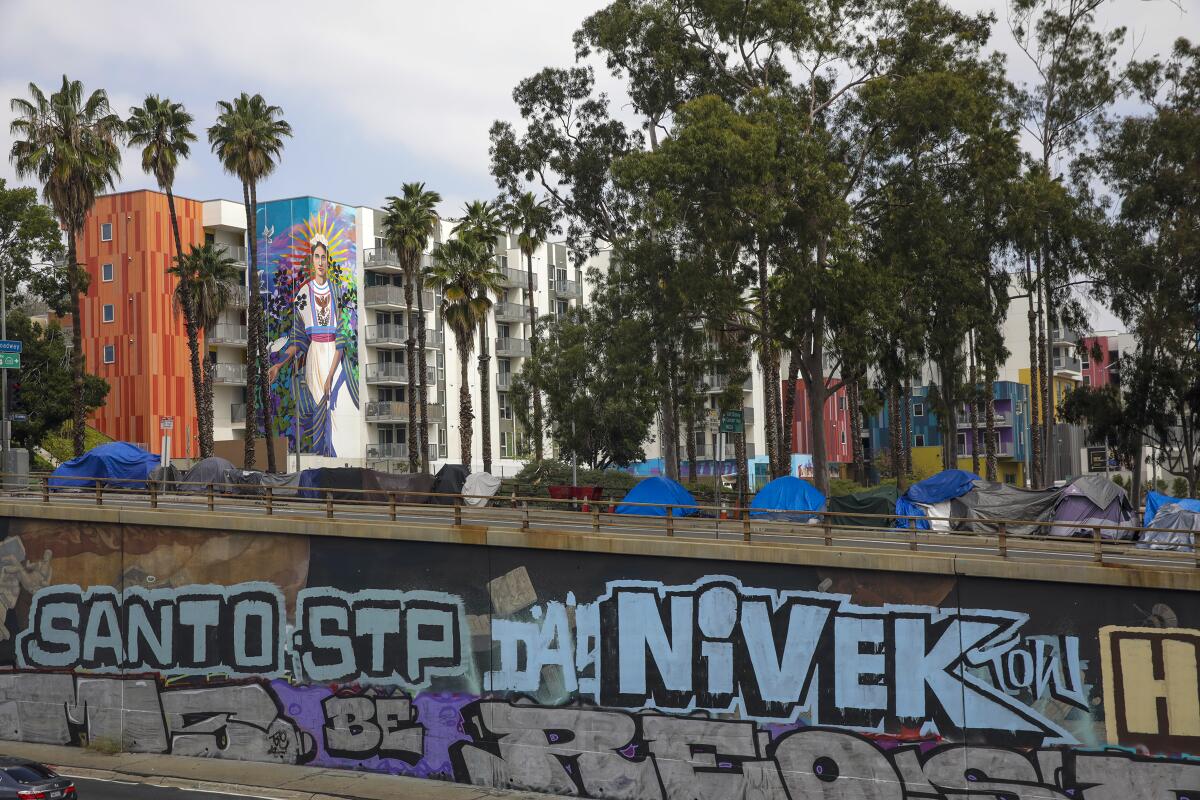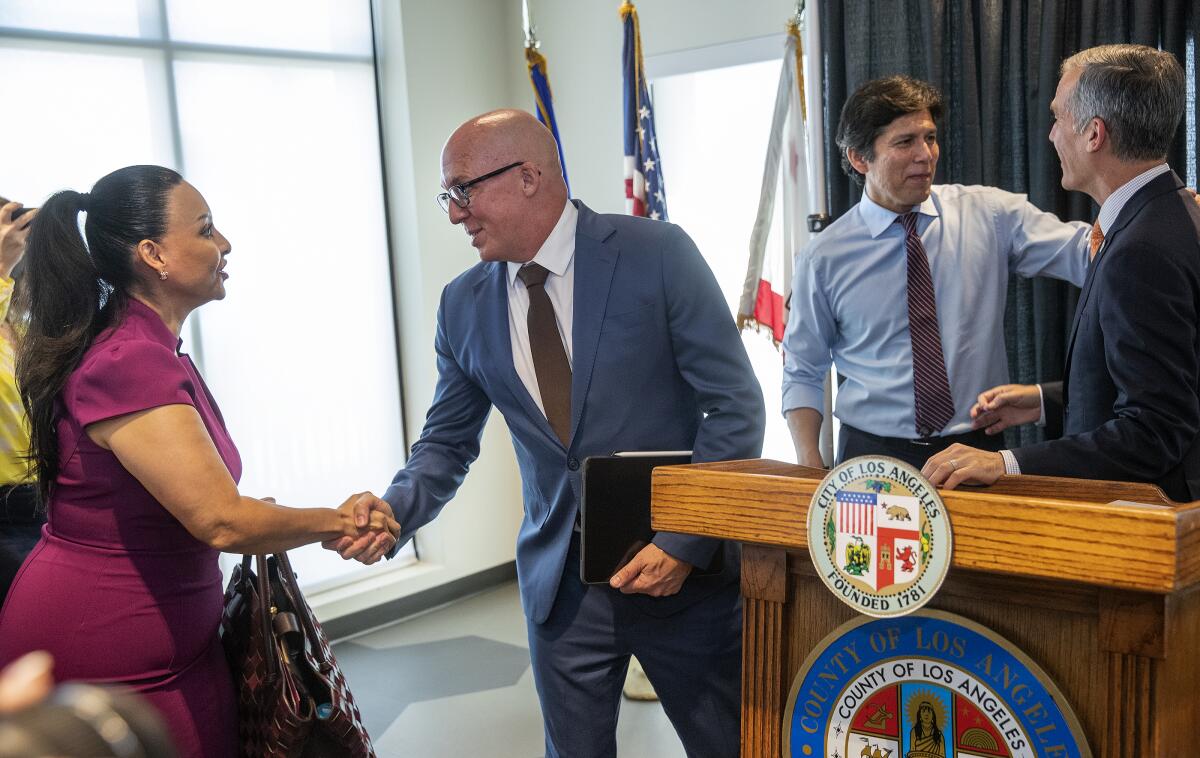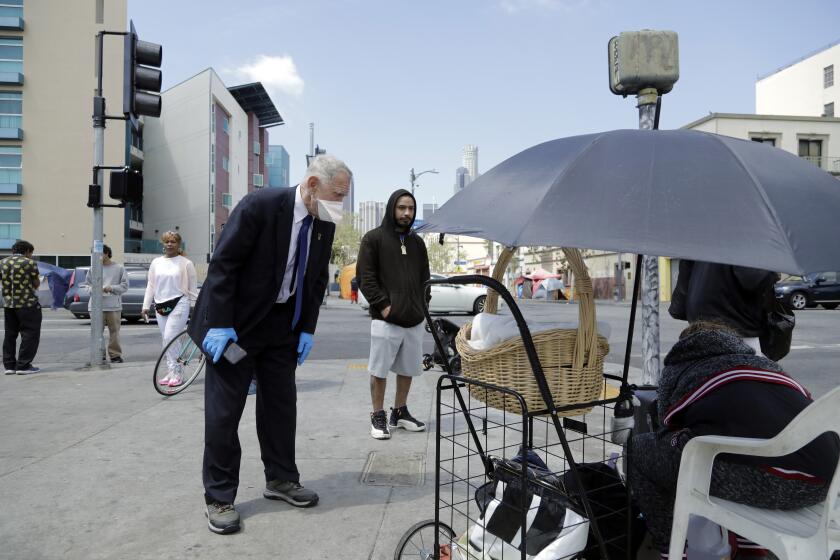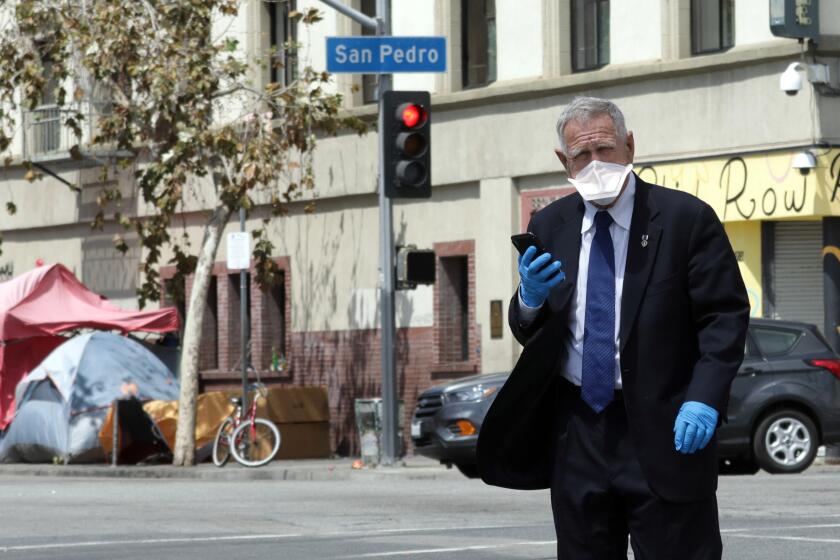L.A. County will boost services under agreement to settle federal homelessness lawsuit

- Share via
Back in April, the city of Los Angeles agreed to settle a sprawling federal lawsuit over the treatment of homeless people, promising to build potentially thousands of new beds and housing units.
Los Angeles County refused to join the settlement, setting off a deep split between the two massive bureaucracies that have long tussled over how to solve the region’s homelessness crisis.
But in a major turnabout Monday, county officials announced a preliminary legal settlement with the plaintiffs, signaling an end to a lawsuit that has spanned all of COVID-19 and taken on a political dimension as elected officials jousted with lawyers over how to best serve people living on the street.
The deal is subject to the approval of the county Board of Supervisors. U.S. District Judge David O. Carter, who has overseen the case, must sign off on the dismissal of the lawsuit as well.

Under the agreement, the county will fund services at interim and permanent housing that the city has or will build as part of the previously announced settlement.
At 76, Judge David Carter knows he shouldn’t be on skid row exposing himself to the coronavirus. But he wants more for L.A.’s homeless people.
The county also committed to increasing the number of so-called multidisciplinary teams from 22 to 34. They most often include mental health and substance abuse services personnel, outreach workers, housing navigators and trained medical staff.
In addition, the deal will nearly double — from 5.5 to 10 — the number of Homeless Outreach & Mobile Engagement teams, which serve Angelenos attempting to overcome severe mental illness. The county also promised to establish 300 additional substance use and mental health beds, according to a copy of the term sheet.
It was unclear how much money the county was committing to spend above the $532 million it already puts toward homeless services, because the total is pegged to the number of new housing units the city produces.
Board of Supervisors Chair Holly Mitchell estimated it could cost about $160 million to fund the services at these yet-to-be-built facilities. In addition, she estimated that expanding the outreach teams for five years would cost about $70 million.
“This settlement calls for additional county resources for a comprehensive suite of services for our unhoused family, friends and neighbors to help them transition off the streets and [offer them] services when they enter shelter and enter permanent supportive housing,” she said.
As recently as spring, the county appeared ready to continue fighting in court. Its lawyers maintained the case was narrowly focused on skid row and argued that it should be dismissed, or that the county be removed as a defendant.
Asked about the about-face, county Chief Executive Fesia Davenport said, “It did not make sense to be constrained by the legal posture of the lawsuit knowing that we needed to do something to solve the problem.”
The lawsuit was filed in March 2020 by the Los Angeles Alliance for Human Rights, composed mostly of downtown residents, business groups and some formerly homeless people. They alleged that the city and county had failed in their duty to protect public health and safety and to provide shelter to people living on the streets.
Get the lowdown on L.A. politics
Sign up for our L.A. City Hall newsletter to get weekly insights, scoops and analysis.
You may occasionally receive promotional content from the Los Angeles Times.
Along with Mitchell, other elected officials appearing at a news conference Monday, including Mayor Eric Garcetti, City Council President Nury Martinez and Councilman Kevin de León, said the agreement served everyone’s needs — a marked contrast from the harsh words some from the city and county had for each other months earlier.
“I was tough, and I’m gonna continue to be tough,” Martinez said of her dealings with the county. “The missing link has always been the services that are needed to help people rebuild their lives and get back on their feet. So that’s always been the issue that I’ve had. So this has been an opportunity to address this.”
De León, whose district includes skid row, called the deal a good start, though he added: “Three hundred beds is not enough.”
In May 2020, Carter ordered the city and county to find shelter for the thousands of people living near freeway overpasses, underpasses and ramps.
That decision was eventually vacated when the city agreed to create housing opportunities for 6,000 people within 18 months, and the county would fund homeless services for the people who ended up staying in these locations after they were built. (The city reported constructing just over 6,000 new beds as of late August last year.)
As part of the deal involving the people living near freeways, the county said it would pay between $50 million and $60 million annually for five years to fund services at interim housing facilities that include tiny homes and hotel rooms rented for homeless people.
The latest settlement essentially mimics that deal’s arrangement, in which the city builds or secures shelter and housing and the county pays for services for the homeless people who move in.
The 9th Circuit Court of Appeals on Thursday struck down a sweeping order by U.S. District Judge David O. Carter to house L.A.’s skid row homeless.
The city agreed in April to open enough beds over the next five years to accommodate 60% of the city’s unsheltered population in each City Council district. The city also argued that thousands of homeless people who suffer from severe physical or mental illness should be the county’s responsibility.
To meet its obligation, the city would need to open about 13,000 beds, based on the recently released results of the countywide homeless count. Nearly 5,300 units of permanent supportive housing through the Proposition HHH bond measure will be built over the next four years, according to the housing department.
That will be counted toward this new goal, but it’s not clear yet what else the city will build to meet their new obligation.
Though this probably marks the end of the legal fight, Matthew Umhofer, an attorney for the L.A. Alliance for Human Rights, said his group would continue to push for more work to be done to address homelessness. Still, he said the city and county are getting something that he felt had been lacking to this point.
“They’re getting beds and accountability,” he said.
More to Read
Sign up for Essential California
The most important California stories and recommendations in your inbox every morning.
You may occasionally receive promotional content from the Los Angeles Times.









